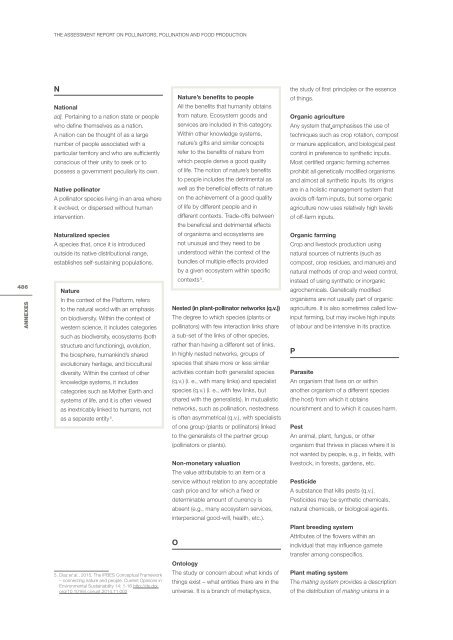POLLINATORS POLLINATION AND FOOD PRODUCTION
individual_chapters_pollination_20170305
individual_chapters_pollination_20170305
Create successful ePaper yourself
Turn your PDF publications into a flip-book with our unique Google optimized e-Paper software.
THE ASSESSMENT REPORT ON <strong>POLLINATORS</strong>, <strong>POLLINATION</strong> <strong>AND</strong> <strong>FOOD</strong> <strong>PRODUCTION</strong><br />
486<br />
ANNEXES<br />
N<br />
National<br />
adj. Pertaining to a nation state or people<br />
who define themselves as a nation.<br />
A nation can be thought of as a large<br />
number of people associated with a<br />
particular territory and who are sufficiently<br />
conscious of their unity to seek or to<br />
possess a government peculiarly its own.<br />
Native pollinator<br />
A pollinator species living in an area where<br />
it evolved, or dispersed without human<br />
intervention.<br />
Naturalized species<br />
A species that, once it is introduced<br />
outside its native distributional range,<br />
establishes self-sustaining populations.<br />
.5<br />
Nature<br />
In the context of the Platform, refers<br />
to the natural world with an emphasis<br />
on biodiversity. Within the context of<br />
western science, it includes categories<br />
such as biodiversity, ecosystems (both<br />
structure and functioning), evolution,<br />
the biosphere, humankind’s shared<br />
evolutionary heritage, and biocultural<br />
diversity. Within the context of other<br />
knowledge systems, it includes<br />
categories such as Mother Earth and<br />
systems of life, and it is often viewed<br />
as inextricably linked to humans, not<br />
as a separate entity 5 .<br />
5. Diaz et al., 2015. The IPBES Conceptual Framework<br />
– connecting nature and people. Current Opinions in<br />
Environmental Sustainability 14: 1-16 http://dx.doi.<br />
org/10.1016/j.cosust.2014.11.002<br />
Nature’s benefits to people<br />
All the benefits that humanity obtains<br />
from nature. Ecosystem goods and<br />
services are included in this category.<br />
Within other knowledge systems,<br />
nature’s gifts and similar concepts<br />
refer to the benefits of nature from<br />
which people derive a good quality<br />
of life. The notion of nature’s benefits<br />
to people includes the detrimental as<br />
well as the beneficial effects of nature<br />
on the achievement of a good quality<br />
of life by different people and in<br />
different contexts. Trade-offs between<br />
the beneficial and detrimental effects<br />
of organisms and ecosystems are<br />
not unusual and they need to be<br />
understood within the context of the<br />
bundles of multiple effects provided<br />
by a given ecosystem within specific<br />
contexts 5 .<br />
Nested (in plant-pollinator networks (q.v.))<br />
The degree to which species (plants or<br />
pollinators) with few interaction links share<br />
a sub-set of the links of other species,<br />
rather than having a different set of links.<br />
In highly nested networks, groups of<br />
species that share more or less similar<br />
activities contain both generalist species<br />
(q.v.) (i. e., with many links) and specialist<br />
species (q.v.) (i. e., with few links, but<br />
shared with the generalists). In mutualistic<br />
networks, such as pollination, nestedness<br />
is often asymmetrical (q.v.), with specialists<br />
of one group (plants or pollinators) linked<br />
to the generalists of the partner group<br />
(pollinators or plants).<br />
Non-monetary valuation<br />
The value attributable to an item or a<br />
service without relation to any acceptable<br />
cash price and for which a fixed or<br />
determinable amount of currency is<br />
absent (e.g., many ecosystem services,<br />
interpersonal good-will, health, etc.).<br />
O<br />
Ontology<br />
The study or concern about what kinds of<br />
things exist – what entities there are in the<br />
universe. It is a branch of metaphysics,<br />
the study of first principles or the essence<br />
of things.<br />
Organic agriculture<br />
Any system that emphasises the use of<br />
techniques such as crop rotation, compost<br />
or manure application, and biological pest<br />
control in preference to synthetic inputs.<br />
Most certified organic farming schemes<br />
prohibit all genetically modified organisms<br />
and almost all synthetic inputs. Its origins<br />
are in a holistic management system that<br />
avoids off-farm inputs, but some organic<br />
agriculture now uses relatively high levels<br />
of off-farm inputs.<br />
Organic farming<br />
Crop and livestock production using<br />
natural sources of nutrients (such as<br />
compost, crop residues, and manure) and<br />
natural methods of crop and weed control,<br />
instead of using synthetic or inorganic<br />
agrochemicals. Genetically modified<br />
organisms are not usually part of organic<br />
agriculture. It is also sometimes called lowinput<br />
farming, but may involve high inputs<br />
of labour and be intensive in its practice.<br />
P<br />
Parasite<br />
An organism that lives on or within<br />
another organism of a different species<br />
(the host) from which it obtains<br />
nourishment and to which it causes harm.<br />
Pest<br />
An animal, plant, fungus, or other<br />
organism that thrives in places where it is<br />
not wanted by people, e.g., in fields, with<br />
livestock, in forests, gardens, etc.<br />
Pesticide<br />
A substance that kills pests (q.v.).<br />
Pesticides may be synthetic chemicals,<br />
natural chemicals, or biological agents.<br />
Plant breeding system<br />
Attributes of the flowers within an<br />
individual that may influence gamete<br />
transfer among conspecifics.<br />
Plant mating system<br />
The mating system provides a description<br />
of the distribution of mating unions in a


